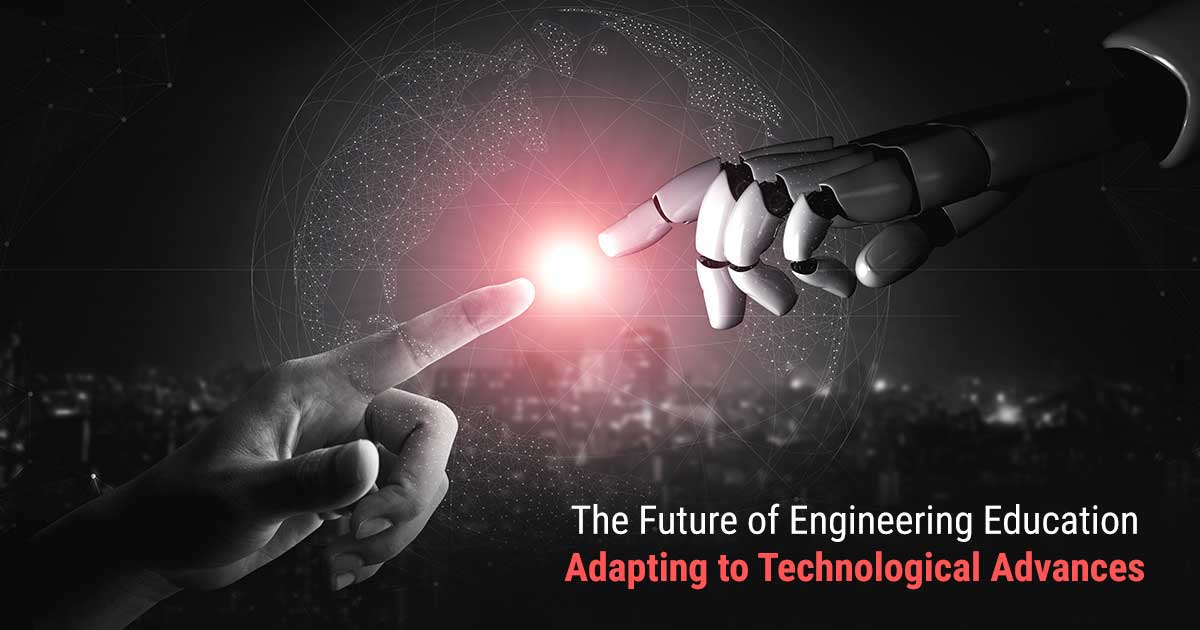FET Blogs


FET Blogs



04 July 2023
Table of Contents:
Has anyone wondered how technology can change the dynamics of engineering education?
Yes, we are talking about engineering students. We all know that engineers are the driving force behind the immense technological advancements around us. This modern world is propelled by engineers who have made our lives better and more convenient with the development of new products and services. So, is it possible that these creators of technological advancements can also be recipients of this significant global impact?
Of course, the answer is yes. Engineers implement the skills of critical thinking, innovation, and curiosity to prepare for what lies ahead. They utilise their knowledge of mathematics and science to bring revolutionary answers that can solve the pressing technical questions of our world today. Being the flag-bearers of technological transformation, we can definitely say that engineering students too shall not be exempted from the impact of technology when it comes to education. In the era of automation, and digitalisation, engineering students shall be equipped with the modern technology and skills necessary to succeed in the ever-changing academic and professional landscape.
Let us understand in depth how the future of engineering education is immensely dependent on adapting to technological developments.
We are all well aware of the evolving digital advancements that are transforming our lives. Almost everything around us has become digital in the past few years. These digital spaces can create opportunities for remote collaborations among engineering students, enabling them to work together on projects, share ideas and solve problems. The digital space also contains repositories of open educational resources that can help students access them anywhere and at any time. The intervention of Augmented Reality (AR) can help engineering students indulge in immersive learning experiences. For example, they can overlay virtual objects onto the real world, thereby allowing them to visualise complex engineering concepts. The usage of online design and collaborative tools like computer-aided design (CAD) allows students to co-create 3D models on a cloud-based platform. The real-time feature of editing and designing the files enhances teamwork and streamlines the design processes seamlessly.
Education has evolved completely in the past few years. It is no longer restricted to just blackboards or whiteboards alone. With the introduction of digital or smart classes, we are witnessing a rise in the implementation of virtual reality in the engineering education sphere. Gamified simulations can be used in engineering courses to learn engineering principles in an interactive way. For example, civil engineers can use these simulations to create a virtual environment to construct and analyse the structural integrity of bridges. Besides this, the students can also present engineering challenges in the form of game-like scenarios. This can be done by students designing a fictional city to check how they can implement the concepts of resource sustainability in virtual reality.
Education 4.0 is the concept of integrating advanced technologies and innovative teaching and learning methods in the field of education. It represents a shift from traditional educational approaches to more personalised, flexible, and technology-driven models of education. In India, Education 4.0 aims to disrupt the disparities in the education realm by empowering the youth to learn beyond the four walls of a classroom. This form of education aspires to prepare students for the challenges and opportunities of the digital age and the Fourth Industrial Revolution. Education 4.0 shall leverage powerful computational tools and software packages that can benefit engineering students. They can use these tools for finite element analysis or circuit simulations to solve complex engineering problems, analyse big data and gain insights. With the help of this technology, we can see engineering students adapt to intelligent learning and tutoring systems that can deliver customised content, assessments, and feedback to students, enabling them to learn at their own pace and in their preferred style.
We can therefore conclude that, as an education segment, engineering is all set to witness a big change, and this will influence the way courses are designed in the future. The rapid expansion and popularity of the digital space will facilitate promising job opportunities for engineers in fields such as computers, IT, analytics, big data, and electronics. Furthermore, we are all set to observe the introduction of gamification in education, which will transform the way students comprehend their lessons and adapt to interactive learning experiences. The introduction of Education 4.0 will also inculcate personalised and immersive learning environments for engineering students in the future.
A1: Technology has enhanced engineering with tools like CAD, AI, and automation.
A2: Technology enables engineers to design, simulate, and innovate efficiently.
A3: Engineering in India has strong scope in AI, renewable energy, and infrastructure.
A4: Engineering drives innovation, sustainability, and technological progress.
Popular Post
17 February 2026
AIE Full Form
10 February 2026
AEIE Full Form
22 January 2026
AE Full Form
16 January 2026
What is Aerospace Engineering?
16 January 2026
What is Chemical Engineering?
Ask an Expert for Free